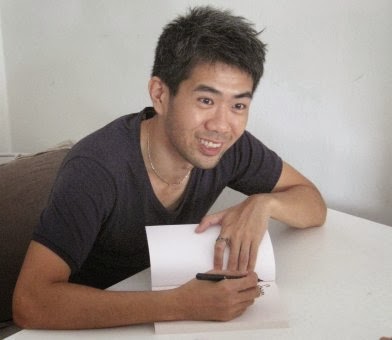I used Chinese-style roasted pork belly, along with sun-dried tomatoes. Well, it was sort of inspired by the Pork Lover's Aglio Olio from Three Little Pigs & The Big Bad Wolf in Bangsar Village.
I cooked for six people.
It took place in someone else's bigger, better-equipped kitchen. I had to use a wok to toss the ingredients and it was hard work. But the experience left me with, among other things, kitchen envy.
It was the first time I'd made spaghetti for anyone else, outside the home - and I somehow got it al dente. At least the assembled thought it was.
And I'd only seriously begun what most would call "cooking" several months ago.
One thing I didn't know, though, was to toss the freshly cooked spaghetti strands in olive oil to keep them from sticking together. One of the hosts pointed that out as I struggled to free the strands from congealing into a heavy tangled mass.
Everybody loved it, and I'm sure they weren't just being polite. Two partygoers took home what was left for dinner the next day - I'm not sure if it would taste the same.
I've been dabbling with some pasta recipes of late, the latest step in my progression towards some degree of self-sufficiency in the home kitchen.

A curried carrot-potato soup with a drizzle of olive oil and
some sunflower seeds (used chicken-stock cubes, so it tasted
like something out of a Maggi packet)
some sunflower seeds (used chicken-stock cubes, so it tasted
like something out of a Maggi packet)

An earlier version of my roast pork-belly pasta; it's advisable
to cut the meat to smaller pieces and fry them with the garlic
before tossing the whole lot with the pasta
to cut the meat to smaller pieces and fry them with the garlic
before tossing the whole lot with the pasta
The seeds of that might have been planted during a lunch date with a former colleague. I used to do the occasional restaurant review for the media back then, and when she knew about this, she asked if I cooked anything myself. I didn't.
"How can you write about food when you don't cook?" she asked, puzzled. "Isn't that kind of hypocritical?"
I don't know about her cooking skills but, man, she doesn't mince words. That stayed with me since, even though I can throw something simple together now.

My idea of a good hot chocolate is a bit different; this cup is a
mix of Valrhona Guanaja (70% dark) and Jivara (milk chocolate)
mix of Valrhona Guanaja (70% dark) and Jivara (milk chocolate)

Here, I use Whittaker's Dark Ghana, and split it into two
portions: one plain and the other with cinnamon
portions: one plain and the other with cinnamon
Since my first experiments with milkshakes and smoothies with a blender, I've been wondering about what else I can do with my hands besides what I do at work with red pens and highlighters.
Putting things in ovens and heating them to death doesn't count as cooking in my book, though I have tried doing that as well - less cleaning up than dishes that require fire and a pot or pan.

A baked salmon - not much work required and great as a lean dinner
when served with blanched vegetables
when served with blanched vegetables

Pigs in blankets, with a little bit extra (garlic and herbs). These later
burst out of their skins (and blankets) under the intense heat, but I
never got around to solving that problem - yet
burst out of their skins (and blankets) under the intense heat, but I
never got around to solving that problem - yet
After I first boiled a bunch of tri-coloured spirals (not sure what they were really called), I've had plenty of successes with pastas aglio olio - a no-brainer of a dish. You don't even have to fry the pasta.
Sauce-based ones were a bit trickier. An attempt at a sardine thingy left my spirals wallowing in some orange-coloured, sardine-flavoured slurry that smelled strongly of fish oil and tasted fine.
Several attempts at a curry-sauce variety were not as successful. The first time, I used too much masala powder. Another time, I got something that smelled and tasted vaguely of Nyonya-styled chilli paste (I used shallots instead of onions).
Every time, I got a bitter taste in the spice mix or sauce. I've learnt since then that some curries need cream. I used Greek yoghurt in my last experiment.

Not-very-good curry sauce pasta; used sausages because I wanted
the protein but nothing good was available
the protein but nothing good was available
But I'm not giving up. Hell, if my Dad managed to make the family's chicken curry once....
And I'm guessing that these skills will come in handy when we start paying extra for tolls, electricity, petrol and stuff, on top of the GST that's coming on April 2015.
But more importantly ... can I write about food now? Or do I need to learn how to cook and rest a steak next?
As I post this, I'm recovering from a(nother) throat infection - and a bout of possible food poisoning, both of which occurred on Christmas Eve. I feel like I'm being told something, but I'm not sure what exactly.
Merry Christmas, everyone.
Categories:
Epicurean Editor,
Misadventures
















